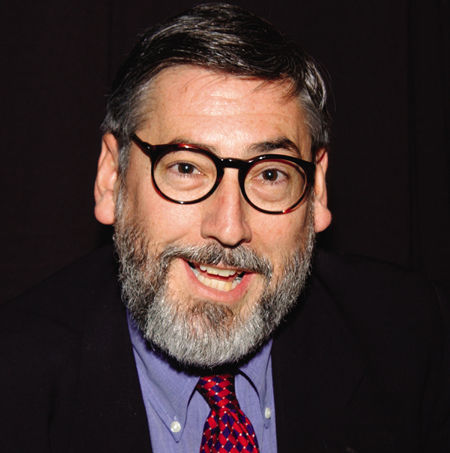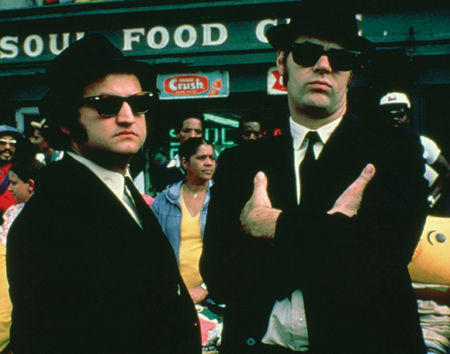John Landis
On the eve of the 25th-anniversary DVD release of The Blues Brothers, iconic director John Landis sits down to talk with HT about the film's restoration, John Belushi, and DVD's impact on the film industry.

The previous Blues Brothers DVD was actually the road-show version: the long version, right?
Well, it wasn't the road-show version. Here's what happened. There was this very scary moment when Lew Wasserman [the then CEO of MCA] called me into his office and said, "John, we're having trouble booking pictures, and we can't road-show it, so you have to take out at least 25 minutes." So, I made some lifts and trims, and we released the movie. And it became a big hit. Years later, when home video became a profit center, Universal came to me and said, "Would you restore the movie?" I said, "I'd love to," and discovered, to my horror, that, in 1985, Universal basically threw out all the trims. The son of the manager of the Picwood Theatre had apparently stolen the print, and, years later, he was trying to sell it, and Universal recovered the print. It was a fairly good print of the movie, with 15 to 17 minutes of stuff that had been cut out. So, for the last release of the Blues Brothers DVD, we restored those scenes. However, in the actual first cut, or the road-show-release version of the movie, it's still missing.
Back to the making of the movie, how many cop cars did you actually use?
We had about 37 basic cop cars. We just changed the logos to read "Mod Squad." We had a 24-hour body shop going in Chicago, and we reused those same cars over and over again. So, it looks like we're trashing hundreds of cars, but we didn't.
I heard that some people in Chicago were a little steamed at the mess you guys made while you were there. Is that true?
No, actually; the filming went incredibly well. There's a very funny story that I guess is what you heard. When we were screening the movie in Chicago, members of the Cook County board were outraged because we conveyed the Cook County building. They were saying, "There's no way we're going to let you do this." And the mayor kept saying, "Gentlemen, it was done a year ago; you didn't even know they were there." And I'm delighted to say that we were the first movie to trash a mall.
Coming out of a fairly cynical decade, the 1970s, do you think that The Blues Brothers helped keep the movie musical alive?
No, I think the movie musical will always be alive. Every genre has cycles. It all depends on box-office success. In fact, Chicago was a hugely profitable musical, and now there are three or four musicals about to come out. Grease and The Rocky Horror Picture Show were in the '70s. I think that all genres come and go, and I'm delighted to call the movie a musical. A lot of people wouldn't call The Blues Brothers a musical, and that upset me terribly.
You've had a very fruitful partnership with Dan Aykroyd.
Oh, yeah. He's a great man; I love Danny. He's a genuinely original thinker. He has amazing ideas: Ghost Busters, The Blues Brothers, the cone-heads. He has a really interesting point of view; he's a great writer and a wonderful performer. I think people don't credit him with just how talented an actor he is. Look at the character he plays in Trading Places, and then look at Elwood in The Blues Brothers; they couldn't be more different. Plus the serious movies he's done: Driving Miss Daisy, Pearl Harbor—although I hated that—he was very good in those.

If John Belushi were still with us, do you think you two might have made another film together?
Oh, absolutely. One of the great tragedies about John Belushi is that, other than moments in Animal House and The Blues Brothers, he was never really caught on film. Also, there's a picture he did called Goin' South where he's very funny. He was a wonderful performer. Look at the first two seasons of Saturday Night Live; you see it there. He was a massive star, but he never really got the opportunity in movies to really show his stuff. Don't use drugs is the moral of the story.
At age 18, you were a stunt man on Once Upon a Time in the West?
Yeah, I went to Europe when I was 18. I was a gofer—they're called production assistants now—on a movie called Kelly's Heroes. After that, in '69, I went to Almeria, Spain, right at the height of the spaghetti-western boom. I actually worked on many, many movies and in any kind of job I could get. It was mostly as a stunt double, but I was also a dialogue coach, an actor, and a schlepper.
Are there any scenes where we could spot you?
Well, I'm usually doubling somebody, so hopefully you can't spot me.
I read somewhere that You've never shot a movie in 2.35:1. Is that true?
No, I haven't, but I would like to. When I made Animal House, they asked me if I wanted to shoot in anamorphic, and I saw that the vast majority of people who see a movie see it on television. By shooting in anamorphic, the major-
ity of people who see your film would see it even more butchered. I like anamorphic very much, though. So, I haven't yet, but I will.
Do you put a good amount of thought into how your movies will look on TV?
Oh, of course. Home video is a positive thing in that you get to own great movies for relatively little money. But it's also a negative because it has affected the box office. I believe that people now—especially people over 25—wait to see a movie on DVD. But nothing duplicates the theatrical experience. For me, one of the big things about the theatrical experience is other people. The more crowded the theater, the scarier a horror movie is. And comedy is meant to be seen with as many people as possible.
Comedy and horror: It's fairly unusual for a director to be so successful in both.
Comedy and horror are very similar in that they're both very unforgiving. A movie is either funny or it's not; it's either scary or it isn't. They're both the most difficult because they involve the suspension of disbelief. But I like everything. Directors, just like actors, get typed. Right now, I'm trying to get Bat Boy off the ground. The guys who wrote the original off-Broadway show have just finished a screenplay for me. God knows if I'll get the money for that, but that's a monster musical. People see that I did "Thriller," I've done monsters and music. You get typed.
The sad thing is you've had such tremendous success, and you're still not free to do everything you'd like. Do you find that success is a trap?
Yes and no. I was very lucky to get started in the studio system in the '70s. It was all director-driven, and I had the opportunity to do what were, at the time, extremely unorthodox movies. Anything radical, if it's successful, is instantly mainstream, from blue jeans to rock-'n'-roll. Everybody has to have it. Animal House has been ripped off so many times. And now movies aren't as brave as they used to be. I personally am delighted at the success of Wedding Crashers, but only because it's R-rated. They don't make R-rated movies now. It's a different time and a different bottom line.
 So you'll only direct music videos for Michael Jackson and no one else?
So you'll only direct music videos for Michael Jackson and no one else?
No, I did one for Paul McCartney, and I've done several for B.B. King. Music videos have changed. Now it's a business for young, hungry directors. The way it works now, the record label sends out the song to a bunch of production companies and directors, and they ask for a presentation. So you're supposed to invent the video, tell them how much it will cost, and present it, and they pick and choose what they like. And I think, #$%@ you; pay me. I'm happy to do it, but pay me. "Thriller" cost $750,000, which, at that time, was an incredible amount of money.
You've made some really iconic films. Is there a secret to your style?
Not that I know of. If there were, I'd bottle it.





























































